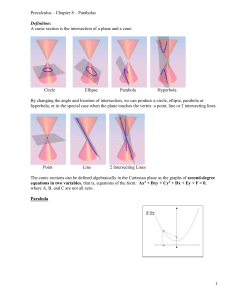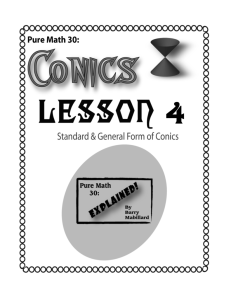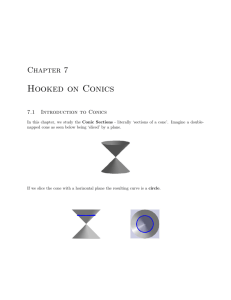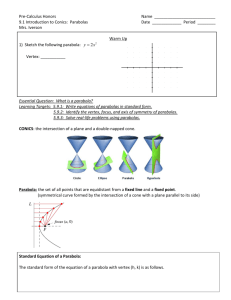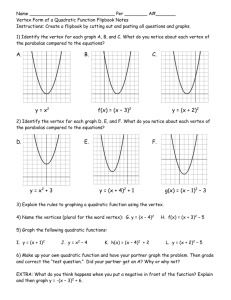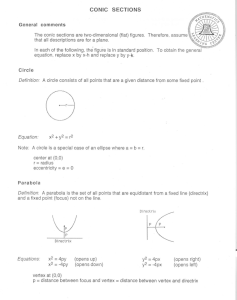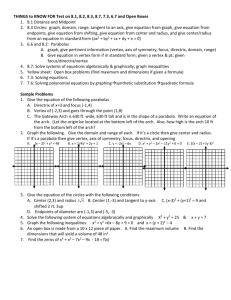Conics: Circles, Ellipses, Parabolas - Pure Math 30 Lesson
advertisement
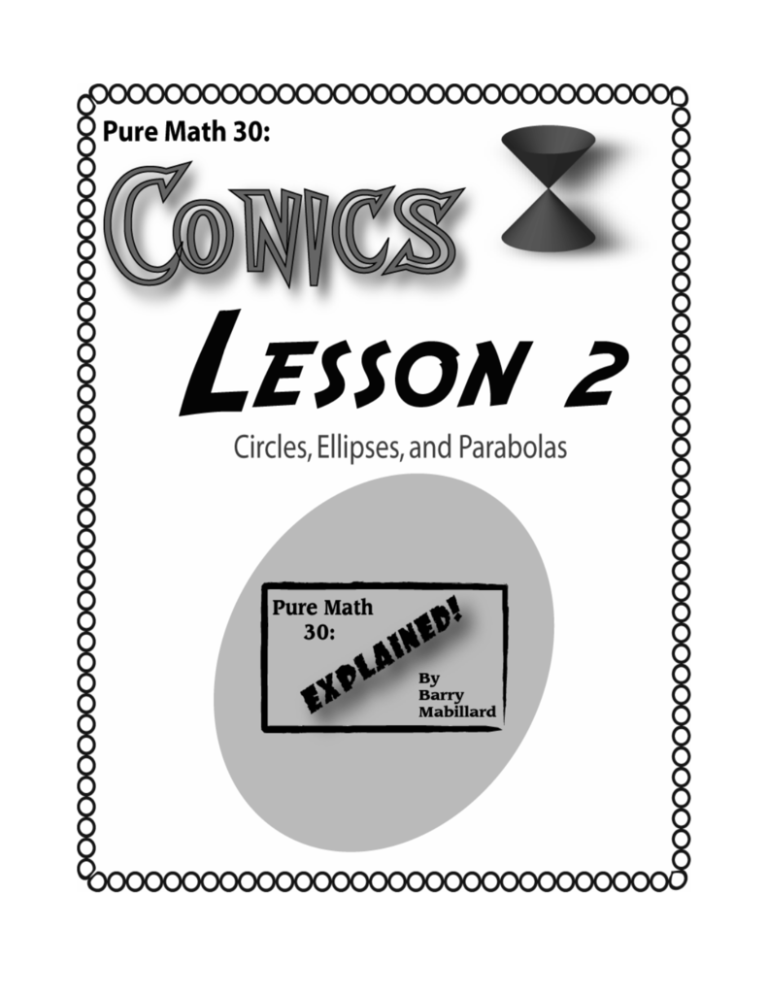
Pure Math 30: Explained! www.puremath30.com 51 Conics Lesson 2 Part I - Circles Circles: The standard form of a circle is given by the equation (x - h)2 + (y - k)2 = r 2 , where (h, k) is the centre of the circle and r is the radius. Example 1: Given the following graph, write the equation. The first thing you should do when given a circle is write down the coordinates of the centre. In this case, the centre is at (-1,0). Next, determine the radius, which is 4 units. Finally, plug the h, k, and r values into the standard form equation and you’ll have the equation of the graph! (x - h)2 + (y - k)2 = r 2 (x - (-1))2 + (y - 0)2 = 42 (x + 1)2 + y 2 = 16 Example 2: Sketch the graph of (x - 3)2 + (y + 4)2 = 9 and state the domain and range. To draw the graph of a circle from a standard form equation, first draw a dot at the centre of the circle. The radius can be found by taking the square root of the number on the right side. (Remember, you’re given r2 and you just want r.) 2 2 (x - 3) +(y + 4) = 9 Quick Tip: An easy way to read off the centre is to use values for x and y that make each bracket go to zero. (x - 3) becomes zero when x = 3 (y + 4) becomes zero when y = -4 So, the centre is at (3,-4) When writing the domain & range for an enclosed shape, we use “in-between notation” Domain: Leftmost Value ≤ x ≤ Rightmost Value Range: Bottom Value ≤ y ≤ Top Value For the circle in this question: Domain: 0 ≤ x ≤ 6 (Read as “the domain is between zero and six”) Range: -7 ≤ y ≤ -1 (Read as “the range is between negative seven and negative one”) Pure Math 30: Explained! www.puremath30.com 52 Conics Lesson 2 Part I - Circles Questions: For each of the following graphs, write the equation, then state domain & range: 1. 2. 3. 4. Pure Math 30: Explained! www.puremath30.com 53 Conics Lesson 2 Part I - Circles Questions: For each of the following equations, draw the graph and state domain & range: 5. (x - 4)2 + (y - 6)2 = 16 7. (x + 5)2 + (y - 3)2 = 49 6. 8. (x - 2)2 + y 2 = 64 x 2 + (y - 3)2 = 100 Pure Math 30: Explained! www.puremath30.com 54 Conics Lesson 2 Part I - Circles Answers: 2 2 1. (x - 3) +(y - 4) = 9 2. 2 2 3. x +(y + 5) = 36 4. (x - 5)2 +(y + 2)2 = 16 Domain: 0 ≤ x ≤ 6 Range: 1 ≤ y ≤ 7 Domain: -6 ≤ x ≤ 6 Range: -11 ≤ y ≤ 1 5. 7. (x + 2)2 + y 2 = 49 Domain: -9 ≤ x ≤ 5 Range: -7 ≤ y ≤ 7 Domain: 1 ≤ x ≤ 9 Range: -6 ≤ y ≤ 2 6. Domain: 0≤x≤8 Domain: -6 ≤ x ≤ 10 Range: 2 ≤ y ≤ 10 Range: -8 ≤ y ≤ 8 8. Domain: -12 ≤ x ≤ 2 Domain: -10 ≤ x ≤ 10 Range: -4 ≤ y ≤ 10 Range: -7 ≤ y ≤ 13 Pure Math 30: Explained! www.puremath30.com 55 Conics Lesson 2 Part II- Ellipses (x - h)2 (y - k)2 Ellipses: The equation of an ellipse is given by = 1, + a2 b2 (h, k) is the centre of the ellipse. “a” represents the horizontal distance from the centre to the edge of the ellipse. “b” represents the vertical distance from the centre to the edge of the ellipse. Example 1: Given the following graph, find the equation of the ellipse: First identify the centre of the ellipse, which in this case is (1,-4). To find the a-value, count horizontally from the centre to the right edge and you will get 5. To find the b-value, count vertically from the centre to the upper edge, and you will get 3. (x - 1)2 (y + 4)2 + =1 25 9 When you put the a & b values into the equation, remember to square them! Example 2: Sketch the graph of Place a point at the centre of the ellipse (-1, 2). The a-value is 9 = 3 The b-value is 25 = 5 (x + 1)2 (y - 2)2 + =1 9 25 Quick Tip: What happens when both a and b are the same number? This will give you a circle. When writing the equation of an ellipse that’ is really a circle, you should use a circle equation instead. x Don’t write 2 + 9 Write x 2 +y y 2 =1 9 2 =9 When a2 is bigger (the number under x) the ellipse is horizontal. When b2 is bigger, (the number under y), the ellipse is vertical Pure Math 30: Explained! www.puremath30.com 56 Conics Lesson 2 Part II- Ellipses Questions: Given the following graphs, write the equation. 1. 2. 3. 4. 5. 6. Pure Math 30: Explained! www.puremath30.com 57 Conics Lesson 2 Part II- Ellipses Questions: Given the following equations, sketch the graph. 7. (x - 5)2 (y +1)2 + =1 9 16 9. x 2 (y + 2)2 + =1 16 25 11. x2 y 2 + =1 16 16 (x - 3)2 + (y + 1)2 = 1 4 8. 10. 12. (x + 3)2 y 2 + =1 36 4 (x +1)2 (y - 3)2 + =1 25 9 Pure Math 30: Explained! www.puremath30.com 58 Conics Lesson 2 Part II- Ellipses Answers: 1. (x - 3)2 (y + 2)2 + =1 16 9 3. (x + 2)2 y 2 + =1 36 4 5. (x - 1)2 (y + 3)2 + =1 4 16 2. x 2 (y - 1)2 + =1 9 25 4. (x + 4)2 + (y - 1)2 = 1 9 6. x2 y2 + = 1 → x2 + y2 = 4 4 4 Pure Math 30: Explained! www.puremath30.com 59 Conics Lesson 2 Part II- Ellipses Answers: 7. 9. 11. 8. 10. 12. Pure Math 30: Explained! www.puremath30.com 60 Conics Lesson 2 Part III - parabolas Parabolas: There are two different standard form equations for parabolas. 2 Vertical parabolas are given by: y - k = a(x - h) . “a” is the vertical stretch factor (Vertical parabolas that open down have a negative sign with the a-value, those opening up have a positive sign.) 2 Horizontal parabolas are given by: x - h = a(y - k) . “a” is the horizontal stretch factor. (Horizontal parabolas that open left have a negative sign with the a-value, those opening right have a positive sign.) (h, k) is the vertex of the parabola. Try to remember the following rules when it comes to standard form parabolas: 2 2 If you have an x , but no y Æ vertical parabola. 2 2 If you have a y , but no x Æ horizontal parabola. Example 1: Given the following graph, write the equation. First note the coordinates of the vertex: (8,0). This gives you h & k To obtain the a-value, find another point on the parabola. By inspection, the point (5, 1) lies on on the graph. This can now be plugged in for x & y. Take the values above and insert them into the standard form of a horizontal parabola: To obtain the final equation, x - h = a( y - k )2 plug in numbers for a, h, & k, 5 - 8 = a(1- 0) 2 leaving x & y as variables. −3 = a Example 2: Sketch the graph of y + 1 = The vertex is located at the point (5,-1), and it’s a upside down vertical parabola. 1 2 x − 8 = −3 y 2 (x - 5)2 When given a parabola equation, it may be graphed in your calculator by isolating y: 1 y = - (x - 5)2 - 1 2 Example 3: Sketch the graph of y + 4 = The vertex is located at the point (-2,-4), and it’s a right-side up vertical parabola. This time, graph the parabola using x & y intercepts instead of the calculator. (The x & y intercept method is being used in this example to illustrate an alternative to using your graphing calculator.) 1 4 (x + 2)2 x — intercepts: y — intercept: Set y = 0, then solve for x. Set x = 0, then solve for y. 1 y + 4 = (x + 2)2 y +4 = 1 0 + 4 = (x + 2)2 y +4 = 1 4 = (x + 2)2 y +4 = 4 4 4 16 = (x + 2)2 ±4 = x + 2 1 4 1 4 1 4 y +4 = 1 y = -3 (x + 2)2 (0 + 2)2 ( 4) x = -6, 2 Pure Math 30: Explained! www.puremath30.com 61 Conics Lesson 2 Part III - parabolas Questions: Given the following graphs, write the equation. 1. 2. 3. 4. 5. 6. Pure Math 30: Explained! www.puremath30.com 62 Conics Lesson 2 Part III - parabolas Questions: Isolate y and then sketch the graph: 7. 9. 11. x = -(y + 2)2 8. 1 (y + 1)2 2 10. y = -(x + 2)2 12. x-2 = y + 2 = 3x 2 y -1 = - 1 (x + 3)2 2 x + 3 = 2(y - 3)2 Pure Math 30: Explained! www.puremath30.com 63 Conics Lesson 2 Part III - parabolas Questions: Using x & y intercepts, graph the following parabolas 13. 15. y +2 = 1 2 ( x - 3) 2 x + 4 = ( y - 1) 2 14. x + 4 = ( y + 1) 16. y+4 = 2 1 (x + 2)2 4 Pure Math 30: Explained! www.puremath30.com 64 Conics Lesson 2 Part III - parabolas Answers: 1. The vertex is at (0, -2) A point is (2, 0) x - h = a(y - k)2 2. 2 - 0 = a(0 - (-2))2 2 = 4a 1 a= 2 1 x = (y + 2)2 2 3. The vertex is at (-3, 5) A point is (1, -3) y - k = a(x - h)2 0 - (-2) = a(1- 0)2 2=a y + 2 = 2x 2 4. The vertex is at (-1, -4) A point is (3, 0) y - k = a(x - h)2 -3 - 5 = a(1- (-3))2 0 - (-4) = a(3 - (-1))2 -8 = a(4)2 -8 =a 16 1 a=2 4 = a(4)2 4 =a 16 1 a= 4 1 y + 4 = (x + 1)2 4 1 y - 5 = - (x + 3)2 2 5. The vertex is at (0, -2) A point is (1, 0) y - k = a(x - h)2 The vertex is at (2, 1) A point is (-2, 0) x - h = a(y - k)2 -2 - 2 = a(0 - 1)2 -4 = a x - 2 = -4(y - 1)2 6. The vertex is at (-1, -1) A point is (0, 3) x - h = a(y - k)2 0 - (-1) = a(3 - (-1))2 1= a(4)2 1 a= 16 x + 1= 1 (y + 1)2 16 Pure Math 30: Explained! www.puremath30.com 65 Conics Lesson 2 Part III - parabolas Answers: 7. 8. y = 3x 2 - 2 y=- 1 (x + 3)2 + 1 2 y = ± -x - 2 x = -(y + 2)2 -x = (y + 2)2 y + 2 = 3x 2 -x = (y + 2)2 y = 3x 2 - 2 ± -x = y + 2 y = ± -x - 2 9. 10. y = ± 2(x - 2) - 1 1 (y + 1)2 2 2(x - 2) = (y + 1)2 x-2 = 2(x - 2) = (y + 1)2 ± 2(x - 2) = y + 1 y = ± 2(x - 2) - 1 12. 11. y = -(x + 2) 2 ⎛ x+3⎞ y=± ⎜ ⎟ +3 ⎝ 2 ⎠ x + 3 = 2(y - 3)2 x+3 = (y - 3)2 2 x+3 = (y - 3)2 2 ± x+3 = y-3 2 y=± x+3 +3 2 Pure Math 30: Explained! www.puremath30.com 66 Conics Lesson 2 Part III - parabolas Answers: 13. y+2 = Vertex (3, -2) y-intercept x-intercepts 0+2 = 1 2 1 2 2 y+2 = 2 y+2 = ( x - 3) ( x - 3) 4 = ( x - 3) ±2 = x - 3 2 y+2 = y= x = 1, 5 5 2 1 2 1 2 ( x - 3) ( 0 - 3) 14. 2 2 9 2 Vertex (-4, -1) x-intercept: 2 x + 4 = ( y + 1) y-intercepts 2 x + 4 = ( y + 1) x + 4 = ( 0 + 1) 0 + 4 = ( y + 1) 2 ±2 = y + 1 y = -3, 1 x +4 = 1 x = -3 = 2.5 2 Vertex (-2, -4) 15. 16. Vertex (-4, 1) x-intercept 2 x + 4 = ( y - 1) y-intercepts 2 x + 4 = ( y - 1) x + 4 = ( 0 - 1) 0 + 4 = ( y - 1) x +4 = 1 x = -3 2 ±2 = y - 1 y = -1, 3 2 x-intercepts 1 y + 4 = (x + 2)2 4 1 0 + 4 = (x + 2)2 4 16 = (x + 2)2 ±4 = x + 2 x = -6, 2 y-intercept 1 y + 4 = (x + 2)2 4 1 y + 4 = (0 + 2)2 4 1 y + 4 = ( 4) 4 y +4 = 1 y = -3 Pure Math 30: Explained! www.puremath30.com 67
